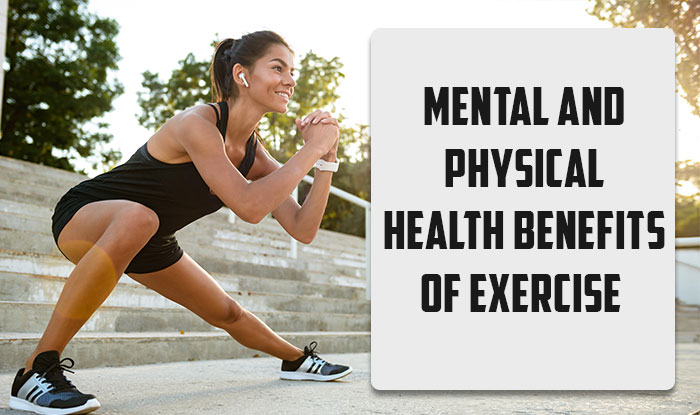For physical and mental health, both therapeutic and preventive exercise has many benefits. Any amount of exercise, even if it is less than the suggested amount, is likely to produce benefits.
Here is a list of some specific benefits of regular exercise/workouts for mental and physical health.
Improves cardiovascular health
Regular exercise is good for heart health. Potential benefits include:
- Improve cholesterol level
- Low blood pressure
- Reduce the risk of heart attack and heart disease
- Reduce the risk of stroke
Reducing the risk of heart disease is an important benefit of exercise.
An individual may begin to experience the benefits of regular exercise from now on, although it is suggested that adults perform 150 minutes of at least moderate-intensity activity a week.
Benefits continue to increase as people become more active than others.
Helps in diabetes management
A variety of exercises, or those with type 2 diabetes, may benefit:
Improve blood sugar control
- Reducing cardiovascular risk factors
- Help with weight loss
- Help with the general welfare
- Preventing or preventing the development of type 2 diabetes
Exercise can also good for people with type 1 diabetes:
- Improve heart health
- Strengthen muscles
- Improve insulin sensitivity
Physical activity and exercise should be recommended and prescribed to all individuals with diabetes as part of glycemic control and management of overall health.
Reduces the risk of some cancers
There is strong evidence that low levels of low risk are associated with high levels of physical activity:
- Colon
- Stomach
- Esophageal
- Breast
- Urinary bladder
- Uterus (endometrial)
- Kidney
For example, a 2016 analysis of 26 breast, prostate, and colorectal cancer studies found that the least active patients had a 37% reduction in cancer-specific mortality compared to the most active patients.
There may also be a link between physical activity and a lower risk of other cancers, but the evidence is less clear.
Improves mental health and mood
Physical activity can help reduce anxiety, and this benefit can begin just after a moderate or vigorous exercise session.
In the long run, regular exercise can also help reduce the risk of depression.
Improves bone health
Regular exercise can help prevent the loss of bone density that occurs with aging.
Aerobic exercise, and average to vigorous muscle strengthening, as well as bone-strengthening programs, also can help.
The real benefits of bone density begin with only 90 minutes of exercise a week.
Weight-balancing exercises, such as walking and dancing, and stability exercises are particularly good for bone health.
Increases your chances of living longer
Strong scientific evidence suggests that physical activity delays death from all causes.
Even better, gains begin to accumulate with moderate amounts of moderate-to-vigorous exercise. The biggest jump occurs when a person becomes insufficiently active from being inactive.
Helps maintain a moderate weight
Exercise can help maintain weight, although it can exceed the recommended amount to do so.
In general, losing weight and then keeping it off also requires a healthy, balanced diet.
It is easy to reduce the number of calories you burn with exercise.
Calories that a person weighs 154 pounds will burn during an hour of activity:
- Hiking: 370 calories
- Gardening: 330 calories
- Running or jogging: 590 calories
May help with chronic pain
Can exercise and physical activity help with chronic pain in adults?
Researchers concluded that a final answer would require more research.
There is some evidence of improved physical functioning and variable effects on both psychological work and quality of life.
There was no harm from any kind of interference.
Helps to prevent falls for older adults
Physical activity involving more than one type, such as aerobic exercise, balance training, or muscle strengthening, may help reduce both the risk of falls and the risk of falls from falls in older adults.
Helps with sleep
Exercise helps people sleep, and some benefits can begin immediately. Regular exercise may help:
- Increase sleeping capacity
- Improve sleep quality and deep sleep
- Daytime drowsiness
- Reduce the need for sleep medicine
Helps with osteoporosis
As exercise helps to improve bone health, it can also treat or prevent osteoporosis.
Regular exercise also helps prevent deterioration and fractures related to muscle weakness and lack of balance, which is particularly important for people with osteoporosis.
Improves brain function and reduces the risk of dementia
Regular exercise may reduce the risk of dementia and Alzheimer’s disease in adults.
In people over the age of 50, exercise also improves some aspects of cognition, such as processing speed.
Physical activity, cognitive activity such as learning a skill, and eating a Mediterranean-style diet promotes brain health in older people.
Results suggested that these behaviors may, perhaps in combination, help keep cognitive manifestations of aging and neurological disease at bay.
Summary
Regular exercise can reduce the risk of many serious illnesses, improve mental health and mood, and extend lifespan. Everyone benefits from exercise.
Some benefits arise with a very small increase in physical activity for those who are currently inactive.
Even if a person is away from the recommended weekly activity levels, those first small steps are important and meaningful.

Reading your article helped me a lot and I agree with you. But I still have some doubts, can you clarify for me? I’ll keep an eye out for your answers.
I am a website designer. Recently, I am designing a website template about gate.io. The boss’s requirements are very strange, which makes me very difficult. I have consulted many websites, and later I discovered your blog, which is the style I hope to need. thank you very much. Would you allow me to use your blog style as a reference? thank you!
I don’t think the title of your article matches the content lol. Just kidding, mainly because I had some doubts after reading the article. https://www.binance.com/en/register?ref=B4EPR6J0